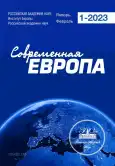"The world is more than five", or turkish justice
- Авторлар: Avatkov V.A.1, Guzaerov R.I.1
-
Мекемелер:
- Institute of Scientific Information for Social Sciences of the Russian Academy of Sciences (INION RAN)
- Шығарылым: № 1 (115) (2023)
- Беттер: 194-201
- Бөлім: Articles
- URL: https://rjsvd.com/0201-7083/article/view/652284
- DOI: https://doi.org/10.31857/S0201708323010163
- EDN: https://elibrary.ru/OTIJMM
- ID: 652284
Дәйексөз келтіру
Аннотация
The concept of justice is actively used in the foreign policy discourse of the Republic of Turkey. The perception of this category in world politics is not uniform. The article is based on the analysis of the book "A Fairer World is Possible", written by Turkish President Recep Tayyip Erdoğan in 2021. The first chapter focuses on the analysis of the modern international system, identifying the main trends in its development and transformation. Special emphasis is made on the injustice of the modern system. A particular attention in the book is given to the issue of the UN reform, as the main symbol of the existing world order. The second chapter is dedicated to proposals on the UN reform, designed to create a more just world order. The main principles and directions of future reforms are highlighted. It is notable that the nature of R. T. Erdogan's theses is ambivalent: the use of the category of justice conceals actions in the foreign arena that run counter to the declared principles. The book gives an understanding of the views of the modern Turkish elite on world politics in general.
Негізгі сөздер
Авторлар туралы
Vladimir Avatkov
Institute of Scientific Information for Social Sciences of the Russian Academy of Sciences (INION RAN)
Email: avatkov.v@yandex.ru
Moscow, Russia
Razil Guzaerov
Institute of Scientific Information for Social Sciences of the Russian Academy of Sciences (INION RAN)
Email: guzaerov99@bk.ru
Moscow, Russia
Әдебиет тізімі
- Аватков В.А. (2021) Популизм во внешней политике Турецкой Республики. Вестник Российского университета дружбы народов. Серия: Международные отношения. № 3 (21). С. 543-554. doi: 10.22363/2313-0660-2021-21-3-543-554
- Аватков В.А., Крылов Д.С., Сыртмач М.М., Якимова Д.А. (2018) Сирийский кризис беженцев. Проблемы вынужденного перемещения на Ближнем Востоке. Свободная мысль. № 6 (1672). С. 129-140.
- Долгов Б.В. (2021) Россия и Турция в региональном и геополитическом пространстве. Контуры глобальных трансформаций: политика, экономика, право. № 3. С. 147-160.
- Ирхин А.А., Москаленко О.А. (2021) "Мир больше пяти". Становление Турции в качестве глобального актора мировой политики: перспективы и вызовы для России. Вестник Российского университета дружбы народов. Серия: Международные отношения. № 1 (21). С. 91-107. doi: 10.22363/2313-0660-2021-21-1-91-107
- Киреев А.А. (2014) Методологический семинар "Возможна ли справедливость в международных отношениях?" (Владивосток, 22 ноября 2013 г.). Ойкумена. Регионоведческие исследования. № 1. С. 128-135.
- Надеин-Раевский В.А. (2021) Турция: от идеологических доктрин к экспансии? Год планеты: экономика, политика, безопасность: Ежегодник. Выпуск 2020 года. Национальный исследовательский институт мировой экономики и международных отношений имени Е.М. Примакова Российской Академии наук (ИМЭМО РАН). Идея-Пресс, Москва. С. 266-278.
- Троицкий М.А. (2022) Конкурирующие концепции справедливости в мировой политике. Полис. Политические исследования. № 2. С. 99-114. doi: 10.17976/2022.02.08
- Ataç C.A. (2019) Pax Ottomanica No More! The "Peace" Discourse in Turkish Foreign Policy in the Post-Davutoğlu Era and the Prolonged Syrian Crisis. Digest of Middle East Studies. No. 1. P. 48-69. doi: 10.1111/dome.12152
- Erdoğan P.T. (2021) Daha adil bir dünya mümkün. Turkuvaz kitap, İstanbul, Türkçe. 216 p.
- Wei M. (2019) Turkish Foreign Policy Towards the Syrian Crisis: Dynamics of Transformation. Asian Journal of Middle Eastern and Islamic Studies. No. 3 (13). P. 462-477. doi: 10.1080/25765949.2019.1630573
Қосымша файлдар









